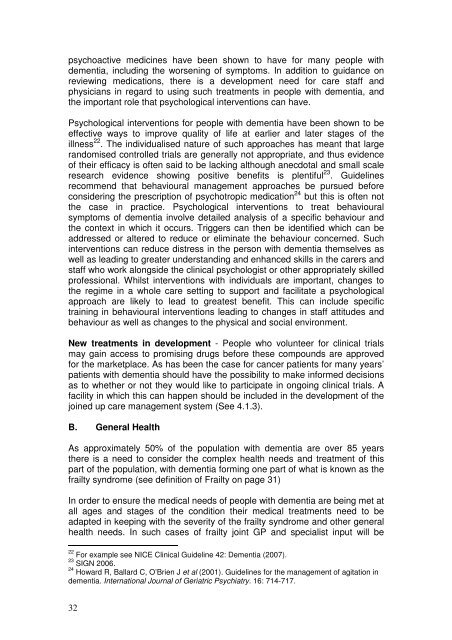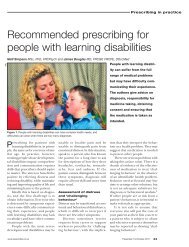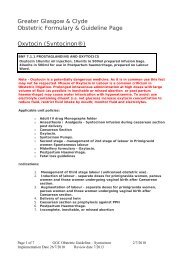The Fife Dementia Strategy: 2010 â 2020 - The Knowledge Network
The Fife Dementia Strategy: 2010 â 2020 - The Knowledge Network
The Fife Dementia Strategy: 2010 â 2020 - The Knowledge Network
You also want an ePaper? Increase the reach of your titles
YUMPU automatically turns print PDFs into web optimized ePapers that Google loves.
psychoactive medicines have been shown to have for many people with<br />
dementia, including the worsening of symptoms. In addition to guidance on<br />
reviewing medications, there is a development need for care staff and<br />
physicians in regard to using such treatments in people with dementia, and<br />
the important role that psychological interventions can have.<br />
Psychological interventions for people with dementia have been shown to be<br />
effective ways to improve quality of life at earlier and later stages of the<br />
illness 22 . <strong>The</strong> individualised nature of such approaches has meant that large<br />
randomised controlled trials are generally not appropriate, and thus evidence<br />
of their efficacy is often said to be lacking although anecdotal and small scale<br />
research evidence showing positive benefits is plentiful 23 . Guidelines<br />
recommend that behavioural management approaches be pursued before<br />
considering the prescription of psychotropic medication 24 but this is often not<br />
the case in practice. Psychological interventions to treat behavioural<br />
symptoms of dementia involve detailed analysis of a specific behaviour and<br />
the context in which it occurs. Triggers can then be identified which can be<br />
addressed or altered to reduce or eliminate the behaviour concerned. Such<br />
interventions can reduce distress in the person with dementia themselves as<br />
well as leading to greater understanding and enhanced skills in the carers and<br />
staff who work alongside the clinical psychologist or other appropriately skilled<br />
professional. Whilst interventions with individuals are important, changes to<br />
the regime in a whole care setting to support and facilitate a psychological<br />
approach are likely to lead to greatest benefit. This can include specific<br />
training in behavioural interventions leading to changes in staff attitudes and<br />
behaviour as well as changes to the physical and social environment.<br />
New treatments in development - People who volunteer for clinical trials<br />
may gain access to promising drugs before these compounds are approved<br />
for the marketplace. As has been the case for cancer patients for many years’<br />
patients with dementia should have the possibility to make informed decisions<br />
as to whether or not they would like to participate in ongoing clinical trials. A<br />
facility in which this can happen should be included in the development of the<br />
joined up care management system (See 4.1.3).<br />
B. General Health<br />
As approximately 50% of the population with dementia are over 85 years<br />
there is a need to consider the complex health needs and treatment of this<br />
part of the population, with dementia forming one part of what is known as the<br />
frailty syndrome (see definition of Frailty on page 31)<br />
In order to ensure the medical needs of people with dementia are being met at<br />
all ages and stages of the condition their medical treatments need to be<br />
adapted in keeping with the severity of the frailty syndrome and other general<br />
health needs. In such cases of frailty joint GP and specialist input will be<br />
22 For example see NICE Clinical Guideline 42: <strong>Dementia</strong> (2007).<br />
23 SIGN 2006.<br />
24 Howard R, Ballard C, O’Brien J et al (2001). Guidelines for the management of agitation in<br />
dementia. International Journal of Geriatric Psychiatry. 16: 714-717.<br />
32
















